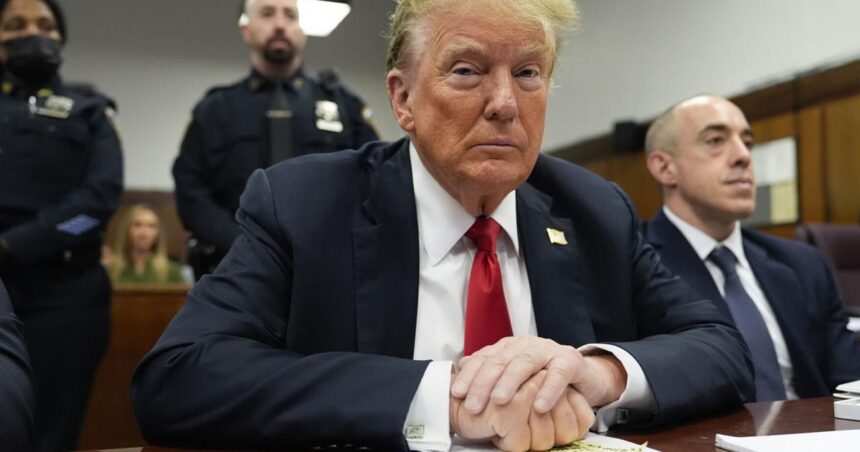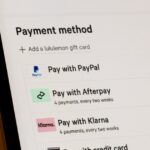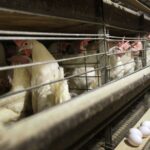NEW YORK (AP) — The jury in Donald Trump’s criminal hush money trial started deliberations on Wednesday after receiving instructions from the judge on the law governing the case and what they can consider in evaluating the former president’s guilt or innocence.
The historic deliberations followed a day of closing arguments, with prosecutor Joshua Steinglass accusing Trump of intentionally deceiving voters by participating in a “catch-and-kill” scheme to bury damaging stories that could harm his 2016 presidential bid. The defense focused on attacking the credibility of star witness Michael Cohen, Trump’s former lawyer, labeling him as “the greatest liar of all time.”
People are also reading…
Trump is facing 34 felony counts of falsifying business records, which carry a maximum sentence of four years in prison. The charges stem from reimbursements paid to Cohen for a $130,000 hush money payment to porn actor Stormy Daniels to keep her claim of a 2006 sexual encounter with Trump private.
Prosecutors allege that the reimbursements were falsely logged as “legal expenses” to conceal the true nature of the transactions.
This case is the first of Trump’s four indictments to reach trial and is considered the first-ever criminal case against a former U.S. president.
— Cohen’s credibility, campaigning at court and other highlights from closing arguments
— Rallies and debates used to define campaigns. Now they’re about juries and trials
— Biden’s campaign shows up outside Trump’s trial with Robert De Niro and others
— Another big name will be at the courthouse in Manhattan on Wednesday: Harvey Weinstein
— Trump hush money case: A timeline of key events
THE JURY HAS BEEN SENT TO DELIBERATE. WHAT EXACTLY DOES THAT MEAN?
Jury deliberations proceed in secret, in a room reserved specifically for jurors and through an intentionally opaque process.
Jurors can communicate with the court through notes that ask the judge for legal guidance or to have particular excerpts of testimony read back to them. However, without knowing what jurors are saying to each other, the meaning of any note is hard to interpret.
It’s unknown how long deliberations will take, as there is no time limit. All 12 jurors must agree on a verdict for each count to be accepted by the judge.
If the jury cannot reach a consensus, the judge may instruct them to keep trying for a verdict. If no agreement is reached, a mistrial may be declared.
TRUMP: ‘MOTHER TERESA COULD NOT BEAT THESE CHARGES’
After jurors began deliberating in his criminal hush money trial, Donald Trump told reporters that the charges were rigged and accused the judge of being conflicted. He stated that “Mother Teresa could not beat these charges” and accused the criminal charges as an attempt by President Joe Biden’s administration to damage him.
Trump emphasized that the charges were unfounded and part of a political attack against him.
Following the judge’s instructions to remain in the courthouse after deliberations began, Trump conversed with his son and lawyer.
MERCHAN ADDRESSES ALTERNATE JURORS
After the main jury in Donald Trump’s hush money case left the courtroom, Judge Juan M. Merchan informed the six alternate jurors remaining to stay on standby in the courthouse as deliberations commenced.
The alternates will be kept separate from the main jury and may replace a main juror if necessary. They must surrender their phones while deliberations are ongoing.
If the jury is deadlocked, the judge may declare a mistrial.
JURY DELIBERATIONS UNDERWAY
Jurors in Donald Trump’s criminal hush money trial have started deliberating, receiving instructions from Judge Juan M. Merchan on the law governing the case and what they can consider.
This trial marks the first-ever criminal case against a former U.S. president.
TWO ELEMENTS PROSECUTORS MUST PROVE FOR A GUILTY VERDICT
Prosecutors must demonstrate two elements for each count to find Donald Trump guilty. First, they must prove that he personally or in concert with others made or caused a false entry in business records with the intent to commit or conceal another crime.
The alleged other crime that Trump intended to commit or conceal is a violation of a state election law regarding unlawful campaign methods.
The potential unlawful means include violations of campaign finance, falsifying business records, and tax laws.
EXPLAINING ‘CONSPIRACY TO PROMOTE OR PREVENT ELECTION’
Judge Juan M. Merchan explained New York’s law against “conspiracy to promote or prevent election” in the case. The law criminalizes conspiracy by two or more people to promote or prevent a candidate’s election by unlawful means.
Trump’s defense team rejected prosecutors’ conspiracy assertions and emphasized that every campaign is essentially a conspiracy to promote a candidate.
EXPLAINING ACCESSORIAL LIABILITY
Judge Juan M. Merchan discussed accessorial liability with the jurors, explaining that a defendant can be held accountable for someone else’s actions if they intended and solicited those actions. This concept is crucial to the prosecution’s argument in Trump’s hush money case.
Trump has pleaded not guilty and denies any wrongdoing in the case.
HOW TO JUDGE THE TRUTH
Judge Juan M. Merchan provided guidance to the jury on assessing witness testimony, emphasizing factors such as plausibility, consistency, demeanor, and motive to lie. However, there is no specific formula for evaluating the truthfulness and accuracy of statements.
Given the defense’s focus on questioning the credibility of key witnesses, the guidance on assessing testimonies is especially relevant.
JUDGE TO JURORS: PERSONAL BIAS MUST BE PUT ASIDE
Judge Juan M. Merchan reminded jurors of their responsibility to decide fairly based on evidence and the law, setting aside personal biases towards or against Trump. He emphasized that Trump is not required to prove his innocence and that the burden of proof remains on the prosecution.
READING OF JURY INSTRUCTIONS UNDERWAY
The jury in Donald Trump’s hush money trial is receiving instructions from Judge Juan M. Merchan on the law governing the case and what they can consider as they deliberate towards a verdict.
TRUMP ARRIVES AT COURT
Donald Trump has arrived at the courthouse in lower Manhattan as proceedings in his hush money trial resume.
He did not engage with reporters as he entered the courtroom.
TRUMP POSTS ON SOCIAL MEDIA BEFORE HEADING TO COURT
Before leaving for court, Donald Trump posted on social media about the trial, accusing it of being unfair and claiming his innocence. He referred to the trial as a “KANGAROO COURT!” and reiterated his belief that the charges were politically motivated.
Trump has been prohibited from making statements about witnesses due to a gag order.
TRUMP’S MOTORCADE HEADS TO COURT
Donald Trump’s motorcade is on its way to the courthouse in lower Manhattan for his hush money trial as jurors prepare to deliberate.
WHO IS ON THE JURY?
The jury in Donald Trump’s hush money trial consists of 18 Manhattan residents, including main jurors and alternates from diverse professional backgrounds.
Jurors’ identities are being kept confidential.
A RECAP OF TESTIMONY JURORS HEARD IN THE CASE
During over four weeks of testimony, prosecutors called 20 witnesses, while the defense called only two. Key witnesses included Michael Cohen, Stormy Daniels, David Pecker, and Keith Davidson.
Cohen testified about the hush money payment to Daniels, while Pecker discussed his involvement in Trump’s campaign. Davidson detailed the negotiations of hush money deals.
The defense’s main witness was attorney Robert Costello.
HOW WILL THE JURY DELIBERATIONS WORK?
Jury deliberations in Donald Trump’s hush money trial will be conducted in secret, with jurors communicating with the court through notes. If consensus is not reached, a mistrial may be declared.
ANOTHER FAMOUS FACE AT THE COURTHOUSE
Harvey Weinstein is expected to appear at the same courthouse as Trump for a hearing related to the retrial of his #MeToo-era rape case.
A MOTION THAT STILL HASN’T BEEN DECIDED
A motion filed by the defense to dismiss the case is pending a decision from the judge.
WHAT MUST BE PROVED FOR A CONVICTION?
To convict Trump of felony falsifying business records, prosecutors must prove that he falsified records with the intent to commit or conceal another crime. The defense must convince at least one juror that guilt was not proven beyond a reasonable doubt to prevent a conviction.
If the jury cannot reach a unanimous verdict, a mistrial may be declared.
Copyright 2024 The Associated Press. All rights reserved. This material may not be published, broadcast, rewritten or redistributed without permission.





